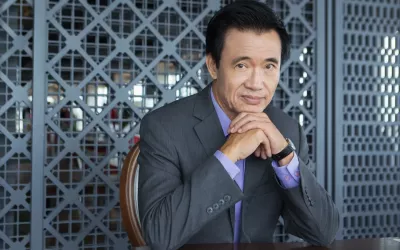
Benefits of an Attitude of Gratitude
American Thanksgiving is such a great idea for a holiday. Our American friends have it right when they stop for a day and give thanks for all they have received. In Japan and in my homeland of Australia, we all have different ways of showing our gratitude and a vivid memory of how my beloved father showed his thanks quickly comes to mind.
When I was a boy growing up in the dusty farmlands of western New South Wales, each night I would see my father kneel at his bedside and pray with Rosary beads in hand, asking God to open the heavens and pour rain down on our 1400-acre property. He would also give thanks for his nine children. Dad had an attitude of gratitude, and encouraged me to think the same positive way.
As 2009 and all its challenges come to a close, the words of my father echo through my soul. Be grateful.
This year began with gloom and doom and it was difficult for many of us to escape feeling some form of fear. From our company’s point of view, we not only had to trudge through the uncertainty of the financial crisis, but also had to deal with other changes, such as when our hot client Wyeth was acquired by Pfizer.
Recruiting can be a tough industry, just like many others, and my friends in the finance and consumer fields said they had never experienced such harsh conditions.
However, to my surprise, foreign Pharma companies continued to hire and this activity has led to a 20% increase in our yearly revenue. It was unexpected and new hiring trends emerged.
This year we have seen an increase in demand for marketing directors linked directly to business units.
The business unit model allows companies to hire the very best talent to oversee product launches. Often the role of these director positions is to supervise four product managers and two or three scientific liaisons officers.
This practice is a significant change from previous years when product managers were in hot demand. The average salary for these directors is 18 million compared to 13-14 million for product managers, reflecting the demand for these specialized positions.
Because the Pharma market place is so competitive, our clients are not leaving anything to chance when executing the launch of a new product. Even though product managers may have been involved in the pre-launch planning, a director is now brought in to ensure the launch is a total success.
Clinical project managers, who have had global clinical trial experience, are also in hot demand and we believe this trend will remain constant for the years to come with CROs, such as Covance, playing a dominant role.
At the recent Philadelphia-Japan Health Sciences Dialogue held in Kobe it was suggested that the way forward for many companies would be to increase the number of licensing and partnering deals within Japan’s emerging markets. This business development trend has led to another specialized position.
Over the past 12 months, this demand was indeed reflected in the number of senior-level business development executives Morunda placed this year.
Pharma candidates who have MBAs are rare in Japan compared to other markets, but those who do have an MBA or have overseas education, are quickly snapped up by global firms.
This year we had two candidates who were first interviewed through teleconferencing and later a face-to-face meeting. They were quickly hired. The best companies know who they are looking for and they do not delay making the right offers.
At the recent DIA conference I chatted to two mid-level hirers from Eisai, both of whom had come from foreign companies. I asked why they joined a domestic/global company and both revealed they desired a better work/life balance.
I then spoke to a 30-year veteran from Chugai who was discussing Roche’s increasing influence on local operations and made a striking statement. “I don’t trust my company anymore,” he said.
Indeed, we all need to be masters of our fate and many traditional Pharma executives are now taking action.
More than 50% of candidates moving to a new position have worked at one company for around 20 years. These people feel it is time for change and I am grateful I can play a role in facilitating this important step forward.
Recent Posts
- Time Kills Deals: Why Speed is Your Most Powerful Hiring Tool
- Beyond the Paycheck: The Four Pillars of Attracting Top Talent in 2026
- The Experience Premium: Why 55 is the New 40 in Tokyo
- Beyond the “Black Swan”: Why Life Science Firms Must Pivot from Perfection to Potential in 2026
- The “Player-Coach” Era: Why Your Technical Pedigree is No Longer Enough


